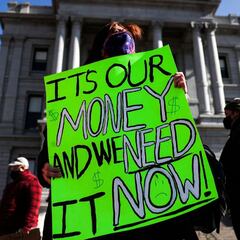Third stimulus check: who voted for and against in the Senate?
The American Rescue Plan narrowly passed the Senate and now heads to the House of Representatives, but which Senators actually voted for the $1.9 trillion bill?


The stimulus bill was passed in a Senate vote on Saturday after a mammoth 12-hour voting session that threatened to see the Democrat’s proposal defeated. It was eventually passed but must return to the House of Representatives for a final vote before it is signed into law.
Included in the $1.9 trillion package is the third round of stimulus checks, which are worth up to $1,400 for eligible American. These direct payments were possibly the most hotly-anticipated part of the bill, which itself had garnered a 76% public approval in recent polls.
However the bill only passed by the finest of margins, so who voted for and against President Biden’s American Rescue Plan?
Party line vote to pass stimulus bill in the Senate
During the campaign Joe Biden had spoken of wanting to govern by consensus, but had also promised a much more extensive stimulus bill than the Republicans in Congress were willing to support.
After weeks of discussions the Democrats decided to utilise reconciliation to pass the bill with just a simple majority, but they were relying on every one of their caucus’ senators voting in favour of the bill. That appeared under threat on Friday when Sen. Joe Manchin of West Virginia suggested he may support a Republican amendment that would have cut the bill’s unemployment benefits considerably.
.@SenSchumer: "We have diverse members, from Bernie Sanders to Joe Manchin. But to their credit, every one of my members realized that failure was not an option." pic.twitter.com/HoGGo1uMks
— The Hill (@thehill) March 7, 2021
He was the only Democrat who was seriously considering dissenting, but after tabling an amendment of their own they were able to bring him back onside.
As such the final vote was a 50-49 in favour of passing the bill, with every Republican senator in attendance voting against the stimulus bill.
Senate vote on minimum wage was more bipartisan
Shortly before the Manchin discussions broke out and triggered the record-breaking vote, senators dismissed a proposal from Sen. Bernie Sanders to raise the minimum wage.
Related stories
The American Rescue Plan had included legislation to gradually increase the federal minimum wage to $15 per hour by 2026, but it had to be removed to satisfy the reconciliation process. The suggestion was reintroduced by Sanders but a number of Democrats voted against the proposal.
Listen to Senator Bernie Sanders' passionate speech on increasing the minimum wage for working-class Americans: pic.twitter.com/WelJGCNYB3
— AJ+ (@ajplus) March 7, 2021
Again all Republican senators voted against the legislation, and were joined by the following members of the Democratic caucus:
- Sen. Jon Tester, D-Mont.
- Sen. Joe Manchin, D-W.V.
- Sen. Jeanne Shaheen, D-N.H.
- Sen. Kyrsten Sinema, D-Ariz.
- Sen. Angus King, I-Maine
- Sen. Tom Carper, D-Del.
- Sen. Chris Coons, D-Del.
- Sen. Maggie Hassan, D-N.H

